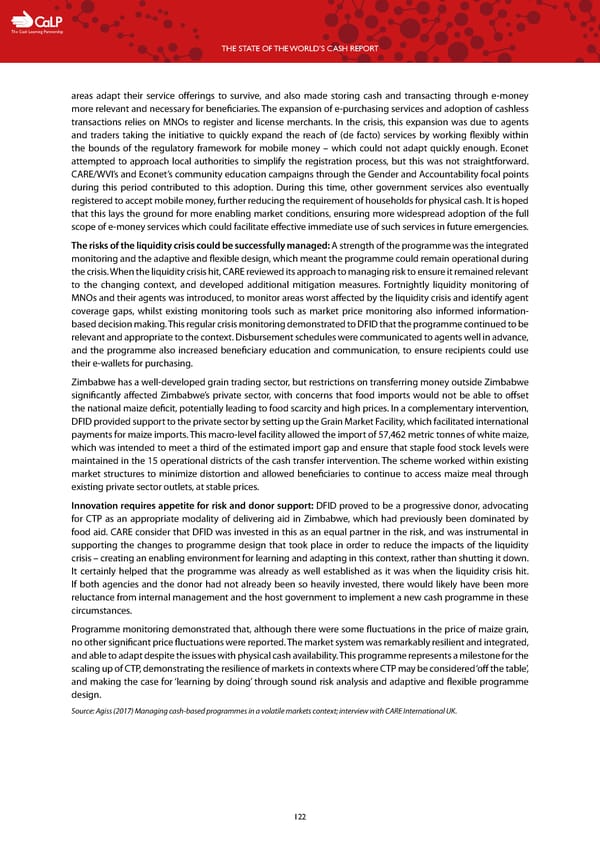C The Cash Learning Partnership THE STATE OF THE WORLD’S CASH REPORT areas adapt their service offerings to survive, and also made storing cash and transacting through e-money more relevant and necessary for beneficiaries. The expansion of e-purchasing services and adoption of cashless transactions relies on MNOs to register and license merchants. In the crisis, this expansion was due to agents and traders taking the initiative to quickly expand the reach of (de facto) services by working flexibly within the bounds of the regulatory framework for mobile money – which could not adapt quickly enough. Econet attempted to approach local authorities to simplify the registration process, but this was not straightforward. CARE/WVI’s and Econet’s community education campaigns through the Gender and Accountability focal points during this period contributed to this adoption. During this time, other government services also eventually registered to accept mobile money, further reducing the requirement of households for physical cash. It is hoped that this lays the ground for more enabling market conditions, ensuring more widespread adoption of the full scope of e-money services which could facilitate effective immediate use of such services in future emergencies. The risks of the liquidity crisis could be successfully managed: A strength of the programme was the integrated monitoring and the adaptive and flexible design, which meant the programme could remain operational during the crisis. When the liquidity crisis hit, CARE reviewed its approach to managing risk to ensure it remained relevant to the changing context, and developed additional mitigation measures. Fortnightly liquidity monitoring of MNOs and their agents was introduced, to monitor areas worst affected by the liquidity crisis and identify agent coverage gaps, whilst existing monitoring tools such as market price monitoring also informed information- based decision making. This regular crisis monitoring demonstrated to DFID that the programme continued to be relevant and appropriate to the context. Disbursement schedules were communicated to agents well in advance, and the programme also increased beneficiary education and communication, to ensure recipients could use their e-wallets for purchasing. Zimbabwe has a well-developed grain trading sector, but restrictions on transferring money outside Zimbabwe significantly affected Zimbabwe’s private sector, with concerns that food imports would not be able to offset the national maize deficit, potentially leading to food scarcity and high prices. In a complementary intervention, DFID provided support to the private sector by setting up the Grain Market Facility, which facilitated international payments for maize imports. This macro-level facility allowed the import of 57,462 metric tonnes of white maize, which was intended to meet a third of the estimated import gap and ensure that staple food stock levels were maintained in the 15 operational districts of the cash transfer intervention. The scheme worked within existing market structures to minimize distortion and allowed beneficiaries to continue to access maize meal through existing private sector outlets, at stable prices. Innovation requires appetite for risk and donor support: DFID proved to be a progressive donor, advocating for CTP as an appropriate modality of delivering aid in Zimbabwe, which had previously been dominated by food aid. CARE consider that DFID was invested in this as an equal partner in the risk, and was instrumental in supporting the changes to programme design that took place in order to reduce the impacts of the liquidity crisis – creating an enabling environment for learning and adapting in this context, rather than shutting it down. It certainly helped that the programme was already as well established as it was when the liquidity crisis hit. If both agencies and the donor had not already been so heavily invested, there would likely have been more reluctance from internal management and the host government to implement a new cash programme in these circumstances. Programme monitoring demonstrated that, although there were some fluctuations in the price of maize grain, no other significant price fluctuations were reported. The market system was remarkably resilient and integrated, and able to adapt despite the issues with physical cash availability. This programme represents a milestone for the scaling up of CTP, demonstrating the resilience of markets in contexts where CTP may be considered ‘off the table’, and making the case for ‘learning by doing’ through sound risk analysis and adaptive and flexible programme design. Source: Agiss (2017) Managing cash-based programmes in a volatile markets context; interview with CARE International UK. 122
 The State of the World's Cash | Full Report Page 123 Page 125
The State of the World's Cash | Full Report Page 123 Page 125